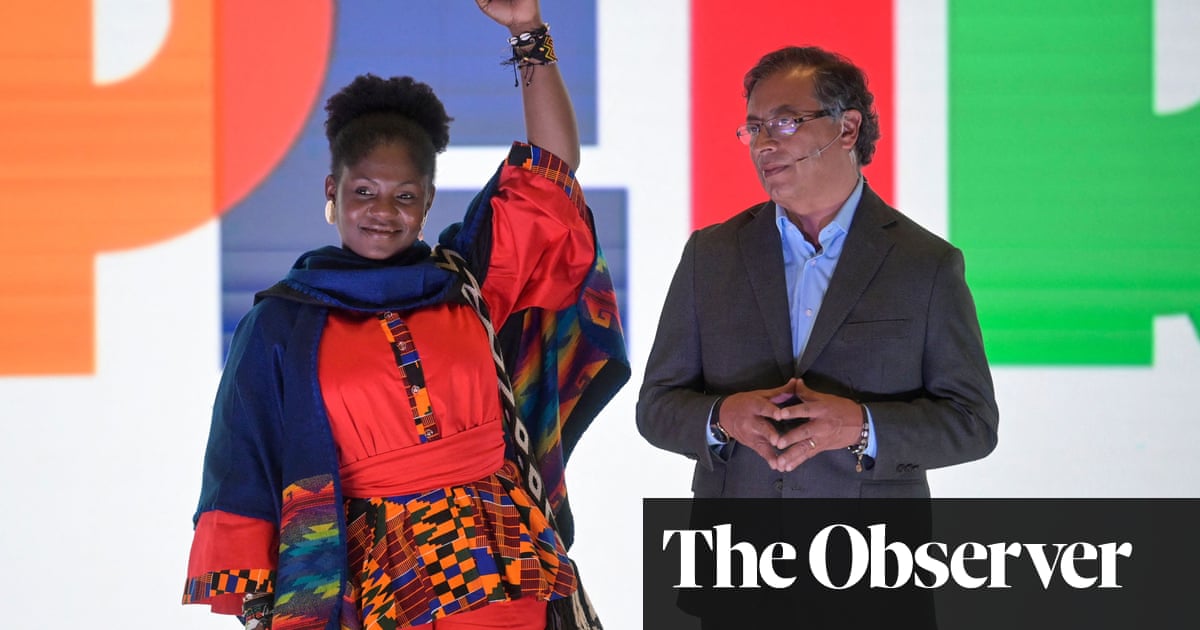The 23-year-old fashion designer dressing Colombia’s first black female vice-president
Esteban Sinisterra Paz, a 23-year-old fashion designer from Colombia’s conflict-ridden and impoverished Pacific region, had not long started his career when he received a call from a history-making client.
Francia Márquez – the renowned environmental activist and Colombia’s first black female vice-president-elect – was on the line, and she wanted two outfits made.
“When I got her call, it was amazing, as it wasn’t just about me or her, it was about our entire community,” said Sinisterra, an Afro-Colombian who runs the bespoke label, Esteban African. “This is a story written by all those who were excluded and ignored, but one day stood up and said, ‘We want change for our community’.”
Designer Esteban Sinisterra Paz: ‘Nobodies like us and Francia were never taken into account, but now we know that we can achieve so much.’ Photograph: The Washington Post/Getty Images
Sinisterra and millions of other voters got his wish on the evening of 16 June when Gustavo Petro, 62 – an ex-guerrilla and the former mayor of Bogotá, the capital – won the presidency after a long and bitter campaign to pry power from the country’s political elites. When Petro takes office today, it will be the first time that the conservative South American country is governed by a leftist.
His campaign was bolstered by the addition of Márquez, 40, to the ticket, who made headlines worldwide when she became Petro’s running mate in March. Like Petro – who was a member of the now-defunct M-19 rebel group in his youth – Márquez is viewed as a firebrand outsider. Much of her support often stems from not being a typical politician, fair-skinned and from wealthy political and business stock.
“Their victory made me really believe in democracy,” said Sinisterra. “Nobodies like us and Francia were never taken into account, but now we know we can achieve so much when we work collectively.”
Márquez, a single mother and former domestic worker, won the prestigious Goldman prize in 2018 for her activism against a goldmine in her village, having led 80 women on a 350-mile march to Bogotá.
Like Márquez, Sinisterra was displaced by Colombia’s conflict with leftist rebel groups including the Revolutionary Armed Forces of Colombia (Farc), which has roiled the countryside for decades, taking over 260,000 lives and forcing seven million from their homes. Other rebel groups, such as the still-active National Liberation Army (ELN), state-aligned paramilitaries, and Colombian security forces, have also committed atrocities.
A peace deal signed with Farc in 2016 was supposed to usher in development to rural communities, but instead other armed groups – leftist and rightist in ideology, but united by their involvement in the drug trade – have moved in and are now jostling for territory.
Sinisterra was forced to flee his home in Colombia’s south-western Nariño province as a young boy when fighting between rival groups grew too intense. “So many armed groups were around, we didn’t even know which was which, but my family knew we had to leave,” the designer said. “I was one of those few young Colombians able to escape the war.”
The designer said Márquez’s outfits, brightly coloured and patterned, reflected Afro-Colombian traditions. “Red is what we use when we want to create that impact of the strength of a woman from the Pacific,” said Sinisterra. “Francia never really had her own aesthetic because she was so focused on her struggle, so it was great to work with her in creating one without losing her essence.”
Despite the groundswell of support for Márquez and Petro in marginalised communities and many cities, the pair will face an unenviable array of challenges in office.
Inflation is rising alongside the country’s national debt, cocaine production is at an all-time high, and neighbouring Venezuela continues to be mired in economic crisis, with refugees fleeing every day into Colombia.
Petro, known for a towering ego and high-handed style, will also have to manage his vice-president, who commands her own support base and is a political newcomer unaccustomed to the dealmaking often required in halls of power.
“Márquez is an activist who is used to demanding often impossible things,” said Sergio Guzmán, the director and co-founder of Colombia Risk Analysis, a local consultancy. “So the question is, how long will she have patience with Petro to deliver on his promises of rural reform, economic justice, and on the renegotiation of the free trade agreement with the United States?”
But for Márquez’s supporters, she represents a rare chance to advance the rights of Colombia’s poorest, who celebrate her intention to set up a ministry for equality.
“Francia is the first black vice-president of a country that for a long time decided to make people like her invisible, and only paid attention to white men,” said Yacila Bondo, a young Afro-Colombian activist. “Now the panorama is wide open.”













